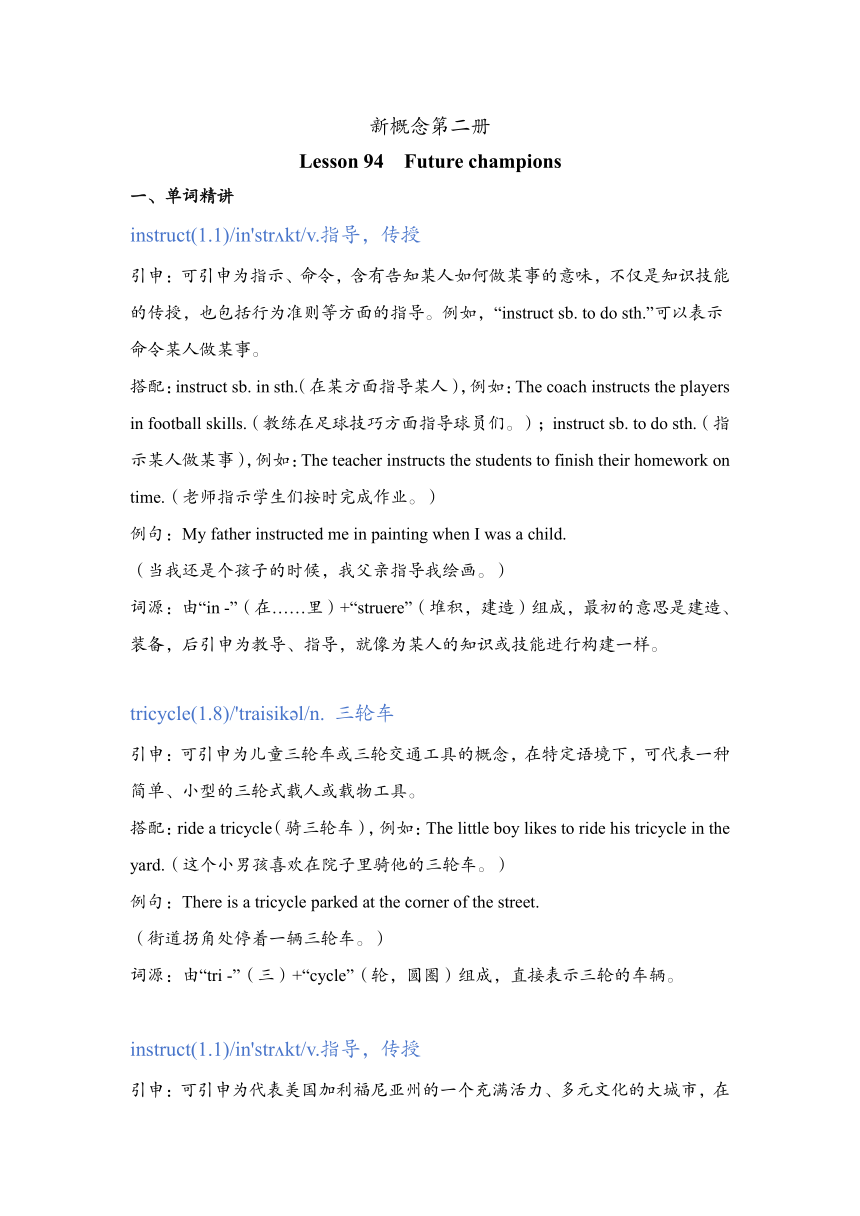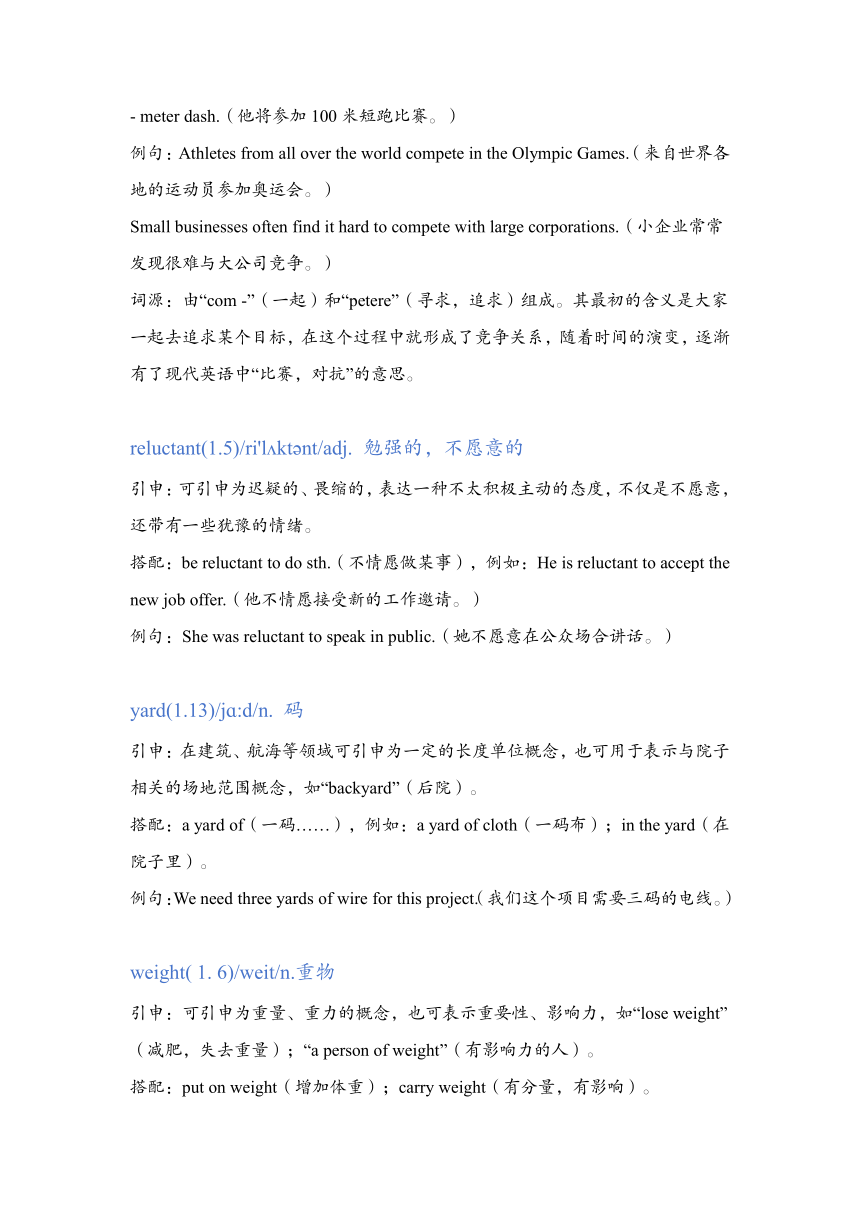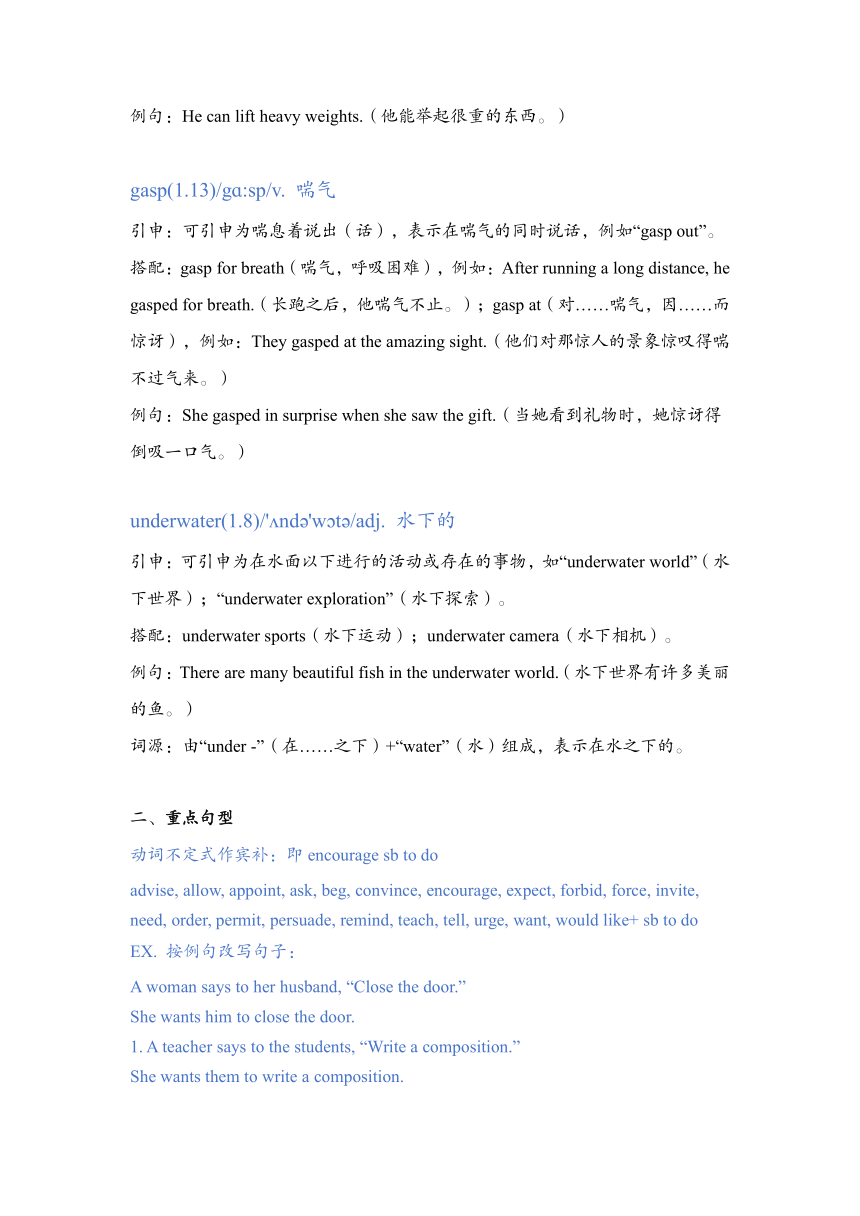新概念第二册Lesson 94 Future champions讲义
文档属性
| 名称 | 新概念第二册Lesson 94 Future champions讲义 |  | |
| 格式 | docx | ||
| 文件大小 | 143.3KB | ||
| 资源类型 | 教案 | ||
| 版本资源 | 新概念英语 | ||
| 科目 | 英语 | ||
| 更新时间 | 2024-11-26 09:01:48 | ||
图片预览




文档简介
新概念第二册
Lesson 94 Future champions
单词精讲
instruct(1.1)/in'str kt/v.指导,传授
引申:可引申为指示、命令,含有告知某人如何做某事的意味,不仅是知识技能的传授,也包括行为准则等方面的指导。例如,“instruct sb. to do sth.”可以表示命令某人做某事。
搭配:instruct sb. in sth.(在某方面指导某人),例如:The coach instructs the players in football skills.(教练在足球技巧方面指导球员们。);instruct sb. to do sth.(指示某人做某事),例如:The teacher instructs the students to finish their homework on time.(老师指示学生们按时完成作业。)
例句:My father instructed me in painting when I was a child.
(当我还是个孩子的时候,我父亲指导我绘画。)
词源:由“in -”(在……里)+“struere”(堆积,建造)组成,最初的意思是建造、装备,后引申为教导、指导,就像为某人的知识或技能进行构建一样。
tricycle(1.8)/'traisik l/n. 三轮车
引申:可引申为儿童三轮车或三轮交通工具的概念,在特定语境下,可代表一种简单、小型的三轮式载人或载物工具。
搭配:ride a tricycle(骑三轮车),例如:The little boy likes to ride his tricycle in the yard.(这个小男孩喜欢在院子里骑他的三轮车。)
例句:There is a tricycle parked at the corner of the street.
(街道拐角处停着一辆三轮车。)
词源:由“tri -”(三)+“cycle”(轮,圆圈)组成,直接表示三轮的车辆。
instruct(1.1)/in'str kt/v.指导,传授
引申:可引申为代表美国加利福尼亚州的一个充满活力、多元文化的大城市,在文化、娱乐(好莱坞)、体育等多方面具有重要意义。
搭配:通常作为地点名词直接使用,如“go to Los Angeles”(去洛杉矶);“live in Los Angeles”(住在洛杉矶)。
例句:Many people dream of going to Los Angeles to see the Hollywood Walk of Fame.(许多人梦想去洛杉矶看好莱坞星光大道。)
Los Angeles(11.2-3)/l s' nd l s/洛杉矶
引申:可引申为竞争、角逐,不仅仅局限于体育比赛,还可以用于商业、学业等领域,表示为了某个目标而相互竞争。例如,“compete for a job”(竞争一份工作)。
搭配:compete with/against sb.(与某人竞争),例如:Our company has to compete with many international companies.(我们公司必须与许多国际公司竞争。);compete for sth.(为某事竞争),例如:They compete for the first prize in the contest.(他们在比赛中竞争一等奖。)
例句:Two teams will compete against each other in the final.
(两支队伍将在决赛中相互对抗。)
词源:源自拉丁语“competere”,由“com -”(一起)+“petere”(寻求,追求)组成,最初表示一起追求某个目标,后演变为竞争的意思。
compete( 1. 9)/k m'pi:t/v. 比赛,对抗
引申:可引申为在各个方面的竞争角逐,如在市场份额、资源、荣誉等方面的争夺。例如在商业领域,企业为了争夺市场份额而相互竞争,就像运动员在赛场上争夺冠军一样。也可表示为争取机会或优势而进行的努力奋斗,类似于竞争的概念。
搭配:compete with/against sb. for sth.(为了某事与某人竞争),例如:Many companies compete with/against each other for the limited market share.(许多公司为了有限的市场份额而相互竞争。)
compete in sth.(参加(某项比赛、竞争等)),例如:He will compete in the 100 - meter dash.(他将参加100米短跑比赛。)
例句:Athletes from all over the world compete in the Olympic Games.(来自世界各地的运动员参加奥运会。)
Small businesses often find it hard to compete with large corporations.(小企业常常发现很难与大公司竞争。)
词源:由“com -”(一起)和“petere”(寻求,追求)组成。其最初的含义是大家一起去追求某个目标,在这个过程中就形成了竞争关系,随着时间的演变,逐渐有了现代英语中“比赛,对抗”的意思。
reluctant(1.5)/ri'l kt nt/adj. 勉强的,不愿意的
引申:可引申为迟疑的、畏缩的,表达一种不太积极主动的态度,不仅是不愿意,还带有一些犹豫的情绪。
搭配:be reluctant to do sth.(不情愿做某事),例如:He is reluctant to accept the new job offer.(他不情愿接受新的工作邀请。)
例句:She was reluctant to speak in public.(她不愿意在公众场合讲话。)
yard(1.13)/jɑ:d/n. 码
引申:在建筑、航海等领域可引申为一定的长度单位概念,也可用于表示与院子相关的场地范围概念,如“backyard”(后院)。
搭配:a yard of(一码……),例如:a yard of cloth(一码布);in the yard(在院子里)。
例句:We need three yards of wire for this project.(我们这个项目需要三码的电线。)
weight( 1. 6)/weit/n.重物
引申:可引申为重量、重力的概念,也可表示重要性、影响力,如“lose weight”(减肥,失去重量);“a person of weight”(有影响力的人)。
搭配:put on weight(增加体重);carry weight(有分量,有影响)。
例句:He can lift heavy weights.(他能举起很重的东西。)
gasp(1.13)/gɑ:sp/v. 喘气
引申:可引申为喘息着说出(话),表示在喘气的同时说话,例如“gasp out”。
搭配:gasp for breath(喘气,呼吸困难),例如:After running a long distance, he gasped for breath.(长跑之后,他喘气不止。);gasp at(对……喘气,因……而惊讶),例如:They gasped at the amazing sight.(他们对那惊人的景象惊叹得喘不过气来。)
例句:She gasped in surprise when she saw the gift.(当她看到礼物时,她惊讶得倒吸一口气。)
underwater(1.8)/' nd 'w t /adj. 水下的
引申:可引申为在水面以下进行的活动或存在的事物,如“underwater world”(水下世界);“underwater exploration”(水下探索)。
搭配:underwater sports(水下运动);underwater camera(水下相机)。
例句:There are many beautiful fish in the underwater world.(水下世界有许多美丽的鱼。)
词源:由“under -”(在……之下)+“water”(水)组成,表示在水之下的。
重点句型
动词不定式作宾补:即encourage sb to do
advise, allow, appoint, ask, beg, convince, encourage, expect, forbid, force, invite, need, order, permit, persuade, remind, teach, tell, urge, want, would like+ sb to do
EX. 按例句改写句子:
A woman says to her husband, “Close the door.”
She wants him to close the door.
1. A teacher says to the students, “Write a composition.”
She wants them to write a composition.
2. The father says to his children, “Study hard.”
He encourages them to study hard.
3. The husband told his wife, “Pick up the kids after school.”
The husband reminded her to pick up the kids after school.
特别注意(考试重点):以下两类动词动词不定式省略to
A.使役词: let, make, have, get
B.感觉动词: see, hear, watch, notice, feel, observe,被动态使用to。
EX. 根据上下文内容填空并口头翻译:
1. Nobody noticed him leave the room.
2. I saw the boy lock the door.
3. Everyone heard you say the word “yes".
4. We are watching the thief run away.
思考:若以上空格中的动词都变成doing对吗?对,表进行概念。
课文精讲
Experiments have proved that children can be instructed in swimming at a very early age.
实验证明,儿童在很小的时候就可以开始学习游泳。
这是一个主从复合句。“Experiments”是主句的主语,“have proved”是主句的谓语,使用现在完成时,表示过去的动作对现在造成的影响。“that children can be instructed in swimming at a very early age”是宾语从句,在这个从句中,“children”是主语,“can be instructed”是谓语,使用了含有情态动词的被动语态,表示能够被指导,“in swimming”是介词短语作状语,表示在游泳方面,“at a very early age”是时间状语。
“prove”表示“证明”;“instruct”表示“指导,教导”。
At a special swimming pool in Los Angeles, children become expert at holding their breath under water even before they can walk.
在洛杉矶的一个特设的游泳池里,孩子们甚至在还没有学会走路时就已经能熟练地在水下屏住呼吸了。
expert at/in doing sth. ……方面的专家,熟练者
Rex soon became an expert at opening the gate.
hold one’s breath 屏住呼吸
Last night, when I heard a strange noise coming from the bar, I held my breath and listened carefully.
Babies of two months old do not appear to be reluctant to enter the water.
两个月的婴儿并未显得不愿意入水。
这是一个简单句。“Babies of two months old”是主语,表示两个月大的婴儿,“do not appear to be reluctant to enter the water”是谓语部分,其中“do not appear”表示看起来不,“to be reluctant to enter the water”是不定式短语作宾语,“reluctant to enter the water”是形容词短语,表示不情愿进入水中。
“reluctant”表示“不情愿的,勉强的”。
It is not long before they are so accustomed to swimming that they can pick up weights from the floor of the pool.
他们很快便适应了游泳,以致能捡起池底的物品。
not long before 不久,很快
be accustomed to n./doing sth. 习惯的,适应了的
He soon became accustomed to his new job.
My mother is accustomed to getting up early.
A game that is very popular with these young swimmers is the underwater tricycle race.
这些幼小的游泳运动员非常喜爱的一种游戏是水下三轮车比赛。
be popular with… 深受……的欢迎,为……所喜爱
Mary is popular with/among children.
Swimming is popular with these girls.
Tricycles are lined up on the floor of the pool seven feet under water.
三轮车并排放在7英尺深的游泳池底上。
line up (使)排成行/排队
Why are people lining up over there
Line these chairs up, please.
The children compete against each other to reach the other end of the pool.
孩子们比赛看谁先到达游泳池的另一端。
compete against 与……竞争,与……抗衡
Many pedal their tricycles, but most of them prefer to push or drag them.
很多孩子用脚蹬车,但多数孩子更愿意推或是拉着三轮车。
这是一个由并列句组成的句子。“Many pedal their tricycles”是第一个并列句,“Many”是主语,表示许多(孩子),“pedal”是谓语,表示踩踏板,“their tricycles”是宾语。“but most of them prefer to push or drag them”是第二个并列句,“but”是并列连词,表示转折,“most of them”是主语,表示他们中的大多数,“prefer to push or drag them”是谓语,表示更喜欢推或拉(三轮车),其中“prefer to”是固定短语,表示更喜欢,“push or drag”是并列的动词,“them”指代“tricycles”。
“pedal”表示“踩踏板”;“push”表示“推”;“drag”表示“拉”。
Some children can cover the whole length of the pool without coming up for breath even once.
有些孩子能够跑完游泳池的全长而不用露出水面换气。
come up for breath 升上水面换气
这是一个简单句。“Some children”是主语,“can cover”是谓语,表示能够覆盖(游过),“the whole length of the pool”是宾语,表示泳池的整个长度,“without coming up for breath even once”是介词短语作状语,表示没有一次浮出水面换气。
“cover”在这里表示“游过,走过(一段距离)”;
Whether they will ever become future Olympic champions, only time will tell.
他们将来是否能成为奥林匹克的冠军,这只能由时间来作出回答。
倒装句,宾语从句置于句首,通常,以疑问词引导的宾语从句会用于这种句型:
What made him do it, no one knows.
How they found out the truth, only George can tell.
Meanwhile, they should encourage those among us who cannot swim five yards before they are gasping for air.
与此同时,他们对我们中的那些游不了5码就已喘不过气来的人应该是种鼓舞。
这是一个主从复合句。“Meanwhile”是时间状语,表示与此同时。“they should encourage those among us”是主句,“they”是主语,“should encourage”是谓语,表示应该鼓励,“those among us”是宾语,表示我们当中的那些人。“who cannot swim five yards before they are gasping for air”是定语从句,用于修饰先行词“those among us”,“who”在从句中作主语,“cannot swim”是谓语,“five yards”是宾语,“before they are gasping for air”是时间状语从句,“they”是主语,“are gasping for air”是谓语,表示喘气。
“gasp for air”表示“喘气,呼吸困难”。
Lesson 94 Future champions
单词精讲
instruct(1.1)/in'str kt/v.指导,传授
引申:可引申为指示、命令,含有告知某人如何做某事的意味,不仅是知识技能的传授,也包括行为准则等方面的指导。例如,“instruct sb. to do sth.”可以表示命令某人做某事。
搭配:instruct sb. in sth.(在某方面指导某人),例如:The coach instructs the players in football skills.(教练在足球技巧方面指导球员们。);instruct sb. to do sth.(指示某人做某事),例如:The teacher instructs the students to finish their homework on time.(老师指示学生们按时完成作业。)
例句:My father instructed me in painting when I was a child.
(当我还是个孩子的时候,我父亲指导我绘画。)
词源:由“in -”(在……里)+“struere”(堆积,建造)组成,最初的意思是建造、装备,后引申为教导、指导,就像为某人的知识或技能进行构建一样。
tricycle(1.8)/'traisik l/n. 三轮车
引申:可引申为儿童三轮车或三轮交通工具的概念,在特定语境下,可代表一种简单、小型的三轮式载人或载物工具。
搭配:ride a tricycle(骑三轮车),例如:The little boy likes to ride his tricycle in the yard.(这个小男孩喜欢在院子里骑他的三轮车。)
例句:There is a tricycle parked at the corner of the street.
(街道拐角处停着一辆三轮车。)
词源:由“tri -”(三)+“cycle”(轮,圆圈)组成,直接表示三轮的车辆。
instruct(1.1)/in'str kt/v.指导,传授
引申:可引申为代表美国加利福尼亚州的一个充满活力、多元文化的大城市,在文化、娱乐(好莱坞)、体育等多方面具有重要意义。
搭配:通常作为地点名词直接使用,如“go to Los Angeles”(去洛杉矶);“live in Los Angeles”(住在洛杉矶)。
例句:Many people dream of going to Los Angeles to see the Hollywood Walk of Fame.(许多人梦想去洛杉矶看好莱坞星光大道。)
Los Angeles(11.2-3)/l s' nd l s/洛杉矶
引申:可引申为竞争、角逐,不仅仅局限于体育比赛,还可以用于商业、学业等领域,表示为了某个目标而相互竞争。例如,“compete for a job”(竞争一份工作)。
搭配:compete with/against sb.(与某人竞争),例如:Our company has to compete with many international companies.(我们公司必须与许多国际公司竞争。);compete for sth.(为某事竞争),例如:They compete for the first prize in the contest.(他们在比赛中竞争一等奖。)
例句:Two teams will compete against each other in the final.
(两支队伍将在决赛中相互对抗。)
词源:源自拉丁语“competere”,由“com -”(一起)+“petere”(寻求,追求)组成,最初表示一起追求某个目标,后演变为竞争的意思。
compete( 1. 9)/k m'pi:t/v. 比赛,对抗
引申:可引申为在各个方面的竞争角逐,如在市场份额、资源、荣誉等方面的争夺。例如在商业领域,企业为了争夺市场份额而相互竞争,就像运动员在赛场上争夺冠军一样。也可表示为争取机会或优势而进行的努力奋斗,类似于竞争的概念。
搭配:compete with/against sb. for sth.(为了某事与某人竞争),例如:Many companies compete with/against each other for the limited market share.(许多公司为了有限的市场份额而相互竞争。)
compete in sth.(参加(某项比赛、竞争等)),例如:He will compete in the 100 - meter dash.(他将参加100米短跑比赛。)
例句:Athletes from all over the world compete in the Olympic Games.(来自世界各地的运动员参加奥运会。)
Small businesses often find it hard to compete with large corporations.(小企业常常发现很难与大公司竞争。)
词源:由“com -”(一起)和“petere”(寻求,追求)组成。其最初的含义是大家一起去追求某个目标,在这个过程中就形成了竞争关系,随着时间的演变,逐渐有了现代英语中“比赛,对抗”的意思。
reluctant(1.5)/ri'l kt nt/adj. 勉强的,不愿意的
引申:可引申为迟疑的、畏缩的,表达一种不太积极主动的态度,不仅是不愿意,还带有一些犹豫的情绪。
搭配:be reluctant to do sth.(不情愿做某事),例如:He is reluctant to accept the new job offer.(他不情愿接受新的工作邀请。)
例句:She was reluctant to speak in public.(她不愿意在公众场合讲话。)
yard(1.13)/jɑ:d/n. 码
引申:在建筑、航海等领域可引申为一定的长度单位概念,也可用于表示与院子相关的场地范围概念,如“backyard”(后院)。
搭配:a yard of(一码……),例如:a yard of cloth(一码布);in the yard(在院子里)。
例句:We need three yards of wire for this project.(我们这个项目需要三码的电线。)
weight( 1. 6)/weit/n.重物
引申:可引申为重量、重力的概念,也可表示重要性、影响力,如“lose weight”(减肥,失去重量);“a person of weight”(有影响力的人)。
搭配:put on weight(增加体重);carry weight(有分量,有影响)。
例句:He can lift heavy weights.(他能举起很重的东西。)
gasp(1.13)/gɑ:sp/v. 喘气
引申:可引申为喘息着说出(话),表示在喘气的同时说话,例如“gasp out”。
搭配:gasp for breath(喘气,呼吸困难),例如:After running a long distance, he gasped for breath.(长跑之后,他喘气不止。);gasp at(对……喘气,因……而惊讶),例如:They gasped at the amazing sight.(他们对那惊人的景象惊叹得喘不过气来。)
例句:She gasped in surprise when she saw the gift.(当她看到礼物时,她惊讶得倒吸一口气。)
underwater(1.8)/' nd 'w t /adj. 水下的
引申:可引申为在水面以下进行的活动或存在的事物,如“underwater world”(水下世界);“underwater exploration”(水下探索)。
搭配:underwater sports(水下运动);underwater camera(水下相机)。
例句:There are many beautiful fish in the underwater world.(水下世界有许多美丽的鱼。)
词源:由“under -”(在……之下)+“water”(水)组成,表示在水之下的。
重点句型
动词不定式作宾补:即encourage sb to do
advise, allow, appoint, ask, beg, convince, encourage, expect, forbid, force, invite, need, order, permit, persuade, remind, teach, tell, urge, want, would like+ sb to do
EX. 按例句改写句子:
A woman says to her husband, “Close the door.”
She wants him to close the door.
1. A teacher says to the students, “Write a composition.”
She wants them to write a composition.
2. The father says to his children, “Study hard.”
He encourages them to study hard.
3. The husband told his wife, “Pick up the kids after school.”
The husband reminded her to pick up the kids after school.
特别注意(考试重点):以下两类动词动词不定式省略to
A.使役词: let, make, have, get
B.感觉动词: see, hear, watch, notice, feel, observe,被动态使用to。
EX. 根据上下文内容填空并口头翻译:
1. Nobody noticed him leave the room.
2. I saw the boy lock the door.
3. Everyone heard you say the word “yes".
4. We are watching the thief run away.
思考:若以上空格中的动词都变成doing对吗?对,表进行概念。
课文精讲
Experiments have proved that children can be instructed in swimming at a very early age.
实验证明,儿童在很小的时候就可以开始学习游泳。
这是一个主从复合句。“Experiments”是主句的主语,“have proved”是主句的谓语,使用现在完成时,表示过去的动作对现在造成的影响。“that children can be instructed in swimming at a very early age”是宾语从句,在这个从句中,“children”是主语,“can be instructed”是谓语,使用了含有情态动词的被动语态,表示能够被指导,“in swimming”是介词短语作状语,表示在游泳方面,“at a very early age”是时间状语。
“prove”表示“证明”;“instruct”表示“指导,教导”。
At a special swimming pool in Los Angeles, children become expert at holding their breath under water even before they can walk.
在洛杉矶的一个特设的游泳池里,孩子们甚至在还没有学会走路时就已经能熟练地在水下屏住呼吸了。
expert at/in doing sth. ……方面的专家,熟练者
Rex soon became an expert at opening the gate.
hold one’s breath 屏住呼吸
Last night, when I heard a strange noise coming from the bar, I held my breath and listened carefully.
Babies of two months old do not appear to be reluctant to enter the water.
两个月的婴儿并未显得不愿意入水。
这是一个简单句。“Babies of two months old”是主语,表示两个月大的婴儿,“do not appear to be reluctant to enter the water”是谓语部分,其中“do not appear”表示看起来不,“to be reluctant to enter the water”是不定式短语作宾语,“reluctant to enter the water”是形容词短语,表示不情愿进入水中。
“reluctant”表示“不情愿的,勉强的”。
It is not long before they are so accustomed to swimming that they can pick up weights from the floor of the pool.
他们很快便适应了游泳,以致能捡起池底的物品。
not long before 不久,很快
be accustomed to n./doing sth. 习惯的,适应了的
He soon became accustomed to his new job.
My mother is accustomed to getting up early.
A game that is very popular with these young swimmers is the underwater tricycle race.
这些幼小的游泳运动员非常喜爱的一种游戏是水下三轮车比赛。
be popular with… 深受……的欢迎,为……所喜爱
Mary is popular with/among children.
Swimming is popular with these girls.
Tricycles are lined up on the floor of the pool seven feet under water.
三轮车并排放在7英尺深的游泳池底上。
line up (使)排成行/排队
Why are people lining up over there
Line these chairs up, please.
The children compete against each other to reach the other end of the pool.
孩子们比赛看谁先到达游泳池的另一端。
compete against 与……竞争,与……抗衡
Many pedal their tricycles, but most of them prefer to push or drag them.
很多孩子用脚蹬车,但多数孩子更愿意推或是拉着三轮车。
这是一个由并列句组成的句子。“Many pedal their tricycles”是第一个并列句,“Many”是主语,表示许多(孩子),“pedal”是谓语,表示踩踏板,“their tricycles”是宾语。“but most of them prefer to push or drag them”是第二个并列句,“but”是并列连词,表示转折,“most of them”是主语,表示他们中的大多数,“prefer to push or drag them”是谓语,表示更喜欢推或拉(三轮车),其中“prefer to”是固定短语,表示更喜欢,“push or drag”是并列的动词,“them”指代“tricycles”。
“pedal”表示“踩踏板”;“push”表示“推”;“drag”表示“拉”。
Some children can cover the whole length of the pool without coming up for breath even once.
有些孩子能够跑完游泳池的全长而不用露出水面换气。
come up for breath 升上水面换气
这是一个简单句。“Some children”是主语,“can cover”是谓语,表示能够覆盖(游过),“the whole length of the pool”是宾语,表示泳池的整个长度,“without coming up for breath even once”是介词短语作状语,表示没有一次浮出水面换气。
“cover”在这里表示“游过,走过(一段距离)”;
Whether they will ever become future Olympic champions, only time will tell.
他们将来是否能成为奥林匹克的冠军,这只能由时间来作出回答。
倒装句,宾语从句置于句首,通常,以疑问词引导的宾语从句会用于这种句型:
What made him do it, no one knows.
How they found out the truth, only George can tell.
Meanwhile, they should encourage those among us who cannot swim five yards before they are gasping for air.
与此同时,他们对我们中的那些游不了5码就已喘不过气来的人应该是种鼓舞。
这是一个主从复合句。“Meanwhile”是时间状语,表示与此同时。“they should encourage those among us”是主句,“they”是主语,“should encourage”是谓语,表示应该鼓励,“those among us”是宾语,表示我们当中的那些人。“who cannot swim five yards before they are gasping for air”是定语从句,用于修饰先行词“those among us”,“who”在从句中作主语,“cannot swim”是谓语,“five yards”是宾语,“before they are gasping for air”是时间状语从句,“they”是主语,“are gasping for air”是谓语,表示喘气。
“gasp for air”表示“喘气,呼吸困难”。
同课章节目录
